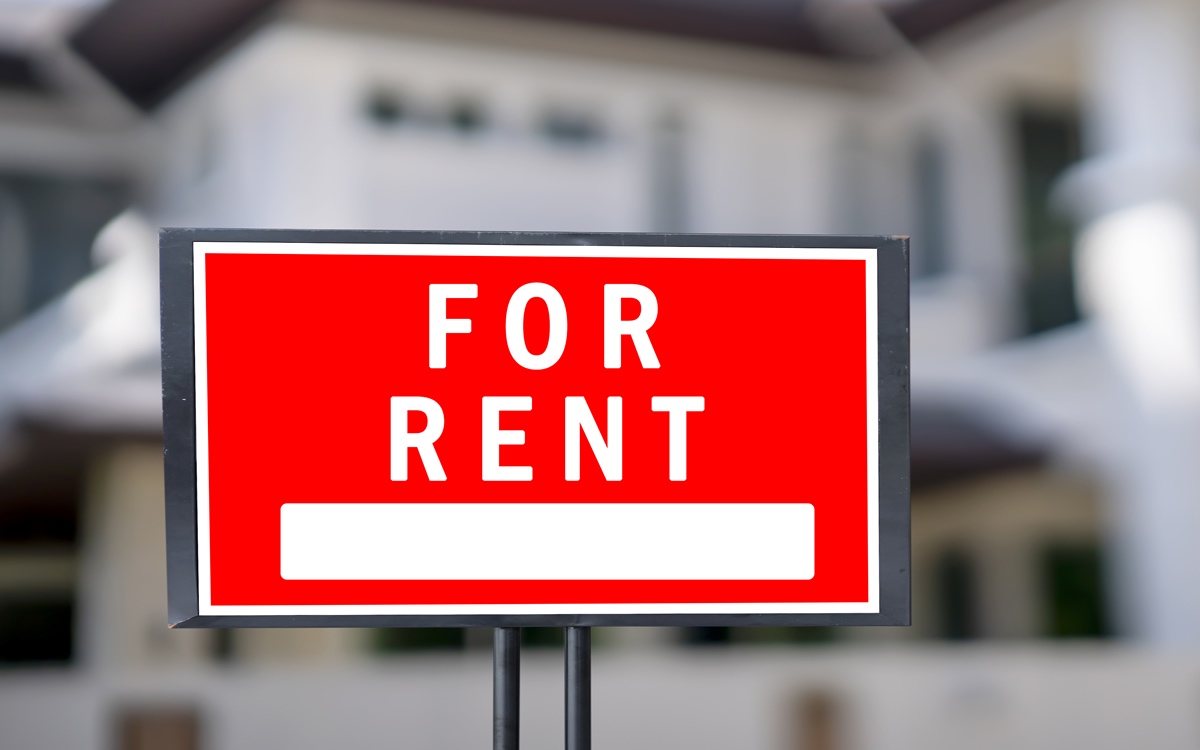Real Estate
How to protect yourself from rental scams
Beware of fraudulent checks, identity theft

As the summer rental season ramps up, be aware that scams can affect both tenants and landlords. As a property owner looking to rent out your space, you might encounter various fraudulent schemes when advertising your property online. Understanding these scams and recognizing the red flags can save you stress and even financial loss.
Three of the most common scams that landlords face in the District of Columbia include the following:
1. Fake Payment Scams
Tenants provide fraudulent checks or money orders for rent or security deposits. These payments appear legitimate initially, but eventually bounce or are identified as fake.
Why it works: Scammers take advantage of the delay between the initial deposit and the time it takes for banks to identify fraudulent checks, allowing them to secure access to the property. Once they do, they have possession and in the District of Columbia, that means a court case to remove them.
Prevention Steps:
- Verify Funds: Wait for the check or money order to fully clear before handing over keys or signing the lease. This can take several days.
- Use Electronic Payments: Encourage tenants to use electronic payment methods like bank transfers or verified payment apps, which can be more secure and quicker to verify.
- Bank Verification: Contact the issuing bank to verify the authenticity of the payment instrument.
2. Identity Theft Scams
Prospective tenants use stolen or fake identities to pass background and credit checks. Once they secure the lease, they may engage in illegal activities or fail to pay rent.
Why it works: Scammers exploit the reliance on documentation and credit reports which, if fake, can be difficult to verify without thorough checks.
Prevention Steps:
- Thorough Screening: Conduct comprehensive background checks, including employment and previous rental history.
As a self-managing landlord, this can be both time-consuming and complicated. There are several easy ways to get caught in unlawful methods of screening based on the Districts strict tenant laws. When in doubt to get it legally right, seek out professional help, so you do not inadvertently end up violating regulations in place to protect renters.
- In-Person Meetings: Meet prospective tenants in person and request multiple forms of identification to verify their identity. Again, it’s critical to do this within the boundaries of the law. Make sure if you do it for one, do the same process, have the same questions and take the same actions for all interested parties.
- Cross-Check Information: Contact employers and previous landlords directly using publicly available contact information to confirm details provided by the tenant. Make sure you are indeed speaking to their prior or current landlord by preparing very specific questions about their lease agreement or other items a fake reference will not know or will stumble to answer.
3. Subletting Scams
Tenants illegally sublet the property to others, often at a higher rate, without the landlord’s knowledge or permission. This can lead to over-occupancy and property damage. You may also not know who is living in your unit or if they would have qualified if you had screened them. Lastly, if they have possession of your property, getting them out involves a court case.
Why it works: Scammers take advantage of landlords who do not monitor their properties closely, allowing them to profit from unauthorized subletting.
Prevention Steps:
- Find management: Ensure that preventative steps are taken, to ensure renter compliance with any sub-letting rules you’ve laid down in the original agreement.
- Regular Inspections: Conduct regular property inspections to ensure that only authorized tenants are residing in the property. Inspections in the District are tricky, a landlord cannot just enter at will or too frequently. Be sure you know the rules, or ask a professional for advice before you enter your renter-occupied property.
- Lease Clauses: Include clear clauses in the lease agreement that prohibit subletting without written permission from the landlord. Is your agreement rock solid? Or do you need professionals on your side who know what to do to ensure both you and your renters are protected fairly?
- Neighborhood Watch: Establish good communication with neighbors who can alert you to any suspicious activity or unauthorized occupants. If you used to live at that location your former neighbors and friends are the best way to keep eyes and ears out on what is going on in your property and to alert you to any unusual behaviors.
By taking these preventive measures, landlords can better protect themselves from common scams and ensure a more secure rental process.
Anatomy of a Common Rental Scam
Another prevalent scam starts when you post an advertisement for your rental property. Scammers may copy your listing, post it at a lower price, and pretend they are the landlords. Unsuspecting tenants may pay a deposit to them or even the first month’s rent to these fraudsters, believing they are securing their new home. Here’s how the scam typically unfolds:
Step 1: Scammers take the details and photos from your legitimate listing and create a fake one, often with lower rent to attract more potential tenants.
Step 2: They claim to be out of town and unable to show the property, urging potential tenants to drive by and view the property from the outside.
Step 3: They ask for a security deposit or the first month’s rent via online payment methods before the tenant has signed a lease or even seen the inside of the property.
How to Protect Yourself
Here are some steps you can take to protect yourself from these scams:
Secure Your Listing: Use reputable rental platforms and websites known for their security measures to advertise your property.
Watermark Your Photos: Adding a watermark to the images in your rental listings can prevent scammers from easily stealing your photos.
Educate Potential Tenants: Inform applicants about common scams and encourage them to be cautious of listings that seem too good to be true, ask for money up front, etc.
Meet or Video Call Potential Tenants: If possible, meet tenants in person or through a video call to verify their identity and discuss the rental terms. Requiring a matching photo ID during the application process is an added layer to ensure this is the same person.
Verify Tenant Information: Conduct a comprehensive background check, including credit, employment, rental history, and criminal records.
Red Flags for Landlords
To protect yourself and potential tenants from a scam like this, be aware of the following red flags during the tenant screening process:
- Paying All Cash Upfront: If a prospective tenant offers to pay the rent for the entire lease period in cash without a proper background check, be cautious. This can be a sign that they want to avoid detection due to illegal activities or poor credit history.
- Urgency to Move In: A tenant who is pushing to move in immediately, especially without seeing the property, should raise a red flag. They might be trying to rush the process before you notice any inconsistencies in their story or background.
- Lack of Interest in Viewing the Property: Be wary of tenants who do not ask to see the property or who are satisfied with just external views. Genuine tenants will usually want to inspect where they are going to live.
- Poor or Incomplete Documentation: If a tenant cannot provide proper identification, proof of income, or previous rental history, this is a significant warning sign. Scammers often avoid giving out personal information that can be traced back to them.
- Unusual Payment Methods: Be cautious if a tenant wants to use unconventional payment methods like wire transfers or cryptocurrency. Standard practices include checks, bank transfers, or credit card payments, which offer more security and traceability.
Organizations That Can Help
If you find yourself a victim of a rental scam, there are organizations that can offer assistance and guidance:
Federal Trade Commission (FTC): They handle complaints about deceptive and unfair business practices, including rental scams. You can file a complaint at ftc.gov.
Better Business Bureau (BBB): The BBB provides information on businesses, including complaints and scam alerts. Visit their website at bbb.org for more resources.
Internet Crime Complaint Center (IC3): This is a partnership between the FBI and the National White Collar Crime Center, and it allows victims to report internet-related criminal complaints. Visit their site at ic3.gov.
Local Law Enforcement: Contact your local police department to report the scam, especially if money has been exchanged.
By staying vigilant and informed, you can protect yourself and potential tenants from falling prey to these sophisticated scams. Remember, prevention is always better than cure, especially in the real estate market.
(Note: For examples of the three scams included, we have produced some of the content of this article using AI.)
Scott Bloom is owner and senior property manager of Columbia Property Management. For more information and resources, go to ColumbiaPM.com.
Real Estate
Spring updates to sell your home for pride and profit
Consider new landscaping, power washing, creative staging

Selling a home is a big deal for anyone, but for members of the LGBTQ+ community, it comes with unique considerations—from finding affirming professionals to ensuring your home is represented in a way that reflects your values. Whether you’re a first-time gay home seller or a seasoned LGBTQ+ homeowner looking to move up, maximizing your home’s value is key to a successful and empowering sale.
Here’s how to prepare your home, your mindset, and your real estate strategy to get the most value—financially and emotionally—from your home sale.
1. Start with an LGBTQ+-Friendly Real Estate Agent
Before diving into renovations or staging, make sure your agent truly understands your needs. A gay-friendly or LGBTQ+-affirming real estate agent brings more than just market expertise—they bring cultural competence, safety awareness, and a network that supports you throughout the selling process.
At GayRealEstate.com, you can find experienced, vetted LGBTQ+ real estate agents who have been proudly serving the community for over 30 years. Working with someone who shares or supports your identity ensures your selling journey is respectful, inclusive, and effective.
2. Enhance Curb Appeal—With a Welcoming Vibe
The outside of your home is the first impression a potential buyer gets. Make it count—especially for LGBTQ+ buyers looking for a home that feels safe and welcoming.
- Fresh landscaping: Add colorful flowers, neatly trimmed shrubs, or low-maintenance greenery to appeal to eco-conscious buyers.
- Update the entrance: A new front door, stylish lighting, or even a rainbow doormat can make your home feel like a safe space from the start.
- Clean and repair: Power wash the exterior, touch up paint, and make any necessary repairs to gutters, windows, or siding.
3. Stage with Intention and Inclusivity
Home staging can add thousands to your sale price. But beyond the usual decluttering and neutral palettes, think about how your space tells a story—and who it’s telling it to.
- Create a warm, inclusive feel: Subtle touches like LGBTQ+ art, books, or even coffee table magazines can show off your personality and affirm the space for queer buyers.
- Depersonalize—but don’t erase: You don’t need to hide your identity to appeal to buyers. Let your home feel lived in and loved—while still being a blank canvas others can imagine themselves in.
- Highlight multi-use areas: Home offices, gender-neutral nurseries, or flex spaces resonate with LGBTQ+ families and professionals.
4. Update Kitchens and Bathrooms Strategically
These rooms matter most to buyers—and even small updates can yield big returns.
- Kitchen: New cabinet hardware, a fresh backsplash, and modern lighting can elevate the entire room without a full remodel.
- Bathroom: Replace old fixtures, re-caulk tubs and sinks, and add plush towels and inclusive décor.
- Energy-efficient upgrades: Touchless faucets, smart appliances, or low-flow toilets are not only trendy—they signal sustainability, which matters to LGBTQ+ buyers.
5. Make Your Home More Energy Efficient
LGBTQ+ homebuyers often prioritize sustainability. These updates not only reduce energy bills but make your home more marketable.
- Install a smart thermostat (like Nest or Ecobee)
- Upgrade insulation or windows
- Consider solar panels (especially in sun-drenched regions like California or Florida)
Bonus: You may qualify for state or federal tax credits, which can be a great selling point.
6. Know and Advocate for LGBTQ+ Housing Rights
Although housing discrimination is illegal under the Fair Housing Act, it still happens. As an LGBTQ+ seller, be aware of your rights—and those of potential buyers.
- Avoid steering or bias: Even with good intentions, make sure you’re not inadvertently influencing who views or buys your home based on identity.
- Work with affirming professionals: From inspectors to lenders, choose partners who support inclusive practices.
- Report discrimination: If you or a buyer encounters bias, report it to HUD or your local housing authority.
7. Price Your Home Right—and Market It Smartly
Setting the right price is essential to maximizing value. Your LGBTQ+-friendly agent can run a comparative market analysis, considering current trends and buyer demographics.
- Leverage LGBTQ+ real estate networks: Promote your home through platforms like GayRealEstate.com to reach an audience that understands and values your space.
- Use inclusive language in listings: Avoid gendered terms or heteronormative assumptions. Instead of “his and hers closets,” use “dual walk-ins” or “double closets.”
- High-quality photos and video tours: Showcase your home with professional, visually inclusive marketing that appeals to diverse buyers.
8. Consider Timing and Local LGBTQ+ Trends
Selling during WorldPride or just before local LGBTQ+ events may boost visibility. Also consider if you’re in or near an LGBTQ+ friendly city or neighborhood.
Not sure which areas are top destinations? GayRelocation.com tracks and shares the best cities for LGBTQ+ homebuyers, helping you tap into motivated buyers.
Final Thought: Sell with Confidence—and Community
Selling your home isn’t just about getting top dollar—it’s about closing a chapter with pride and integrity. When you center your values, work with LGBTQ+ affirming experts, and prepare your home with purpose, you’re not just maximizing your home’s value—you’re creating an empowering experience for yourself and the next owner.
Whether you’re buying, selling, or both—GayRealEstate.com is your trusted partner in every step of your journey. With a nationwide network of gay and lesbian realtors, decades of experience, and deep community ties, we ensure your home transition is safe, smart, and full of pride.
GayRealEstate.com is the nation’s leading online platform connecting LGBTQ+ home buyers and sellers with LGBTQ+ friendly real estate agents, ensuring a safe and supportive experience.
Scott Helms is president of GayRealEstate.com. To find an agent or learn more, visit GayRealEstate.com, GayRelocation.com or call 1-888-420-MOVE.
Real Estate
Navigating DMV real estate market during political unrest
Reductions in federal employment have introduced uncertainties

The Washington, D.C.-Maryland-Virginia (DMV) region has long been recognized for its robust housing market, underpinned by the presence of the federal government and a diverse economic landscape. Recent massive reductions in federal employment have introduced uncertainties, yet the area continues to offer compelling reasons for prospective homebuyers, particularly within diverse communities.
While the federal government has traditionally been a significant employer in the DMV, the region has proactively diversified its economic base. Sectors such as technology, professional services, education, and healthcare have expanded, mitigating the impact of federal job cuts. This diversification fosters some economic resilience, which offers our area a semblance of protection against the impending unknowns that we currently face. Nothing can shield real estate entirely; however, our area tends to survive these types of changes better than other parts of the country.
Despite concerns over federal layoffs, the DMV housing market has demonstrated notable stability. Analyses indicate that the number of active listings, sold properties, and median sales prices have remained steady on a year-over-year basis. This steadiness suggests that the market is adapting to changes without significant disruption.
Furthermore, while there has been a slight increase in home listings, this trend aligns with typical seasonal variations and does not solely reflect federal employment changes. The luxury property segment, in particular, continues to thrive, indicating sustained interest and investment in the region.
The DMV region is renowned for its cultural and demographic diversity, with areas like Montgomery County, Md., being among the most ethnically diverse in the nation. This inclusivity extends to various communities, including LGBTQ individuals, fostering a welcoming environment that enhances the area’s appeal. Even though the current administration is fostering anti-diversity ideology, I remain confident that our LGBTQ community will continue to thrive even as these destructive forces work against us.
Local governments within the DMV have implemented policies aimed at promoting affordable housing and preventing displacement, particularly in the wake of economic shifts. Initiatives like the Douglass Community Land Trust in Washington, D.C., exemplify efforts to maintain housing affordability and support community stability.
Additionally, jurisdictions such as Montgomery County have longstanding Moderately Priced Dwelling Unit (MPDU) programs that require developers to include affordable housing in new residential developments. These policies contribute to socioeconomically mixed neighborhoods, benefiting diverse populations.
Despite Elon Musk’s brandishing of a chainsaw to the federal workforce, our real estate market continues to thrive. The DMV region maintains its appeal. Economic diversification, market stability, commitment to diversity and inclusion, and progressive housing policies collectively contribute to an environment that supports and attracts diverse communities. Prospective homebuyers can find reassurance in the region’s resilience and ongoing efforts to foster an inclusive and vibrant community. These are only a few among the many reasons to have a positive outlook while considering real estate options in our area.
It is important to consider working with brokerages, brokers, agents, lenders and title companies who align with our community and our objectives. Not all LGBTQ agents work for brokerages that support or understand the needs of the members of our community. Do your research and find out who has donated money to what political causes. Now more than ever we must support members of our community to protect our way of life and our very existence.
Stacey Williams-Zeiger is president/principal broker of Zeiger Realty Inc. Reach her at [email protected].

Whether you are upgrading parts of your current home to prepare it for sale or enhancing the home you just purchased, kitchens and bathrooms are still at the top of the renovation list.
Kitchen renovations have always embraced a blend of functionality, personalization, and aesthetic appeal; however, homeowners are currently moving away from sterile, uniform designs, opting instead for spaces that reflect warmth, character, and individual style. Here are some of the most prominent trends shaping kitchen renovations this year.
Warm and Earthy Tones
The dominance of all-white kitchens is waning as homeowners gravitate toward warmer, earth-toned palettes. Shades like sage green, navy blue, and natural wood finishes are becoming popular choices for cabinetry, infusing kitchens with a cozy and inviting atmosphere. This shift reflects a desire for spaces that feel more personalized and less clinical. Flat panel and Shaker cabinets continue to be popular options.
Integration of Organic Modernism
The “modern organic” style is gaining traction, characterized by using natural materials, neutral color palettes, and serene layouts. Incorporating elements like soapstone countertops, Venetian plaster walls, slate floors, and greenery not only enhances aesthetic appeal but can also increase home values significantly. Fully outfitted outdoor kitchens further contribute to this trend.
Innovative Kitchen Island Designs
Kitchen islands continue to be central features, with designs evolving to incorporate textures, wood and tile cladding, multifunctional elements, and bold colors and materials. Integrated seating areas, waterfall countertops, and the use of monolithic stone or stacked marble are becoming increasingly popular. These islands not only serve as functional workspaces but also as striking focal points within the kitchen.
Concealed Kitchens for a Sleek Look
The concept of concealed kitchens is on the rise, emphasizing built-in appliances, flush cabinetry, and appliance garages to maintain a clutter-free environment. This design approach fosters a minimalist aesthetic, creating a seamless flow between the kitchen and adjacent living areas, particularly in open-concept homes.
Personalized Cabinetry and Storage Solutions
Customization is key in modern kitchen designs, with homeowners seeking tailored storage solutions that cater to their specific needs. Features like hidden storage compartments, integrated lighting, and unique hardware choices are being favored over generic, cookie-cutter options. This trend underscores a move toward kitchens that are both functional and reflective of personal style.
Revival of Traditional Styles with Modern Twists
Traditional kitchen styles are making a comeback, with a contemporary twist. Elements such as expanded backsplash coverage, classic tile shapes and patterns, use of mixed metals, and specialty appliances are being integrated into modern kitchens, blending the charm of the past with the conveniences of the present. Custom range hoods, coffee bars and microwave drawers are increasingly added to renovation projects. This fusion creates spaces that are both timeless and equipped for modern living.
Sustainable and Natural Materials
Sustainability remains a priority, with an increased use of eco-friendly materials like reclaimed wood, recycled metals and glass, and energy-efficient appliances. This not only reduces environmental impact but also introduces unique texture and shimmer into kitchen designs, adding depth and character to the space.
Use of Bold Colors and Accents
Homeowners are becoming more adventurous with color and texture, incorporating vibrant hues and tactile materials into their kitchen designs. Features like colorful window trims, two-tone cabinets, and the use of wallpaper and feature walls add visual interest and a personalized touch to the space. In addition to the familiar white, major appliances are now shown in matte black, navy, and jewel tones of red, green, and blue. There are even vinyl wraps and magnet covers that allow for more creativity and individualization with appliances.
Integration of Smart Technology
The incorporation of smart technology continues to grow, with appliances featuring automated cooking functions, sensor reheating, and control locks becoming more prevalent. Induction stoves are entering the mix. Charging stations and touch-activated cabinet doors and faucets are also popular. LED lighting lasts longer and prevents you from having to climb a ladder to change lightbulbs on a high or vaulted ceiling. These advancements enhance convenience and efficiency, aligning with the modern homeowner’s desire for a kitchen that supports a tech-savvy and busy lifestyle.
Multifunctional Spaces
Kitchens are increasingly being designed as multifunctional spaces that accommodate cooking, dining, working, and socializing. This has led to the inclusion of features like integrated seating, versatile lighting, and adaptable layouts that can easily transition between different uses, reflecting the evolving role of the kitchen in contemporary homes. Still, don’t be surprised to see a resurgence of self-contained kitchens with real walls.
So, whether the kitchen you want is sleek and modern, earthy and organic, or traditional and elegant, there will always be fresh new styles, ideas, innovations and classic touches that cater to your lifestyle.
Valerie M. Blake is a licensed Associate Broker in D.C., Maryland, and Virginia with RLAH @properties. Call or text her at 202-246-8602, email her via DCHomeQuest.com, or follow her on Facebook at TheRealst8ofAffairs.
-

 Federal Government2 days ago
Federal Government2 days agoHHS to retire 988 crisis lifeline for LGBTQ youth
-

 Opinions2 days ago
Opinions2 days agoDavid Hogg’s arrogant, self-indulgent stunt
-

 District of Columbia1 day ago
District of Columbia1 day agoD.C. police seek help in identifying suspect in anti-gay threats case
-

 Opinions1 day ago
Opinions1 day agoOn Pope Francis, Opus Dei and ongoing religious intolerance












